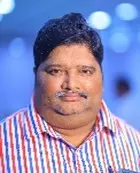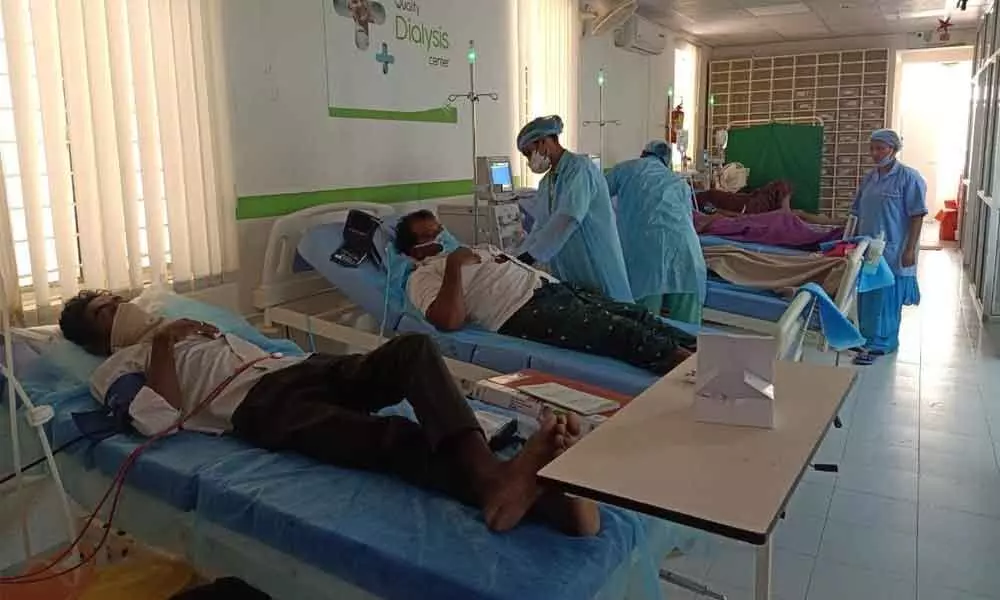Live
- Gentle in manner, resolute in convictions: Sonia Gandhi pens emotional note for Dr. Manmohan Singh
- 2024: A landmark year for India's defence achievements and breakthroughs
- 2025 Horoscopes: Insights and Guidance by Pt. Umesh Chandra Pant
- Osamu Suzuki was a legendary figure in global auto industry: PM Modi
- “AMOEBA”: Celebrating the Journey of Telugu Entrepreneur Sri Motaparti Siva Rama Vara Prasad
- Sachin Khedekar recites a poem from director Feroz Abbas Khan’s powerful new play, ‘Hind 1957’
- NABL-QCI appoints Dr. Sandip Shah as chairperson
- Centre transfers Rs 2.23 lakh crore for 1,206 schemes under Direct Benefit Transfer
- BGT 2024-25: Watching Konstas bat reminds me of Symonds, says Hayden
- 75 iconic lighthouses in India saw more than 10 lakh visitors till September
Just In
Ongole: Transport costs arm and leg for kidney patients


Ongole: People in need of regular dialysis and blood transfusion are forced to shell out huge amounts to reach hospitals for their scheduled...
Ongole: People in need of regular dialysis and blood transfusion are forced to shell out huge amounts to reach hospitals for their scheduled appointments. Owing to the lockdown, autorickshaws or taxis are demanding huge money, at least three times the regular charge. Unable to pay the amount, the patients are demanding the government to allow them to use the 108 or 104 services for to and fro the hospital. If not, they are demanding the government to provide an allowance of Rs 5,000 or so for the transport.
With the restriction on the movement and harsh measures being resorted to by the police in implementing them are making people to dread to venture on to roads. The incidents of police using lathis on people who are going to hospitals have also sent shivers down the spines of patients, especially of chronic kidney diseases like thalassemia, anaemia and AIDS among others.
The kidney disease patients need to undergo dialysis from two times a week to two times a month. It is estimated that there are around 20,000 patients across the state who require dialysis regularly, including about 5,000 in Prakasam district.
Mannam Malakondaiah of Tanneruvaripalli of Konakanamitla mandal in the district regularly visits Markapuram for dialysis. Though he can't drive the bike continuously for a long distance, now he is forced to use the two-wheeler by taking a number of breaks before reaching the hospital. He said that he had to convince the police multiple times to reach Markapuram. He said, "I require the dialysis and going through this ordeal only to survive. Coronavirus cannot stop me. But the journey to the hospital is my problem. The police cannot understand the reports and my urgency for dialysis. They denied my requests to take autorickshaw for Markapuram, though the driver demanded Rs 3,000 for the trip. So, I chose to ride the bike to here though it is risky for me."
The patients are more worried about the charges the autorickshaw drivers and cab drivers are demanding. Illuri Polamma, a dialysis patient from Bestavaripet, said that the autorickshaw driver, which she booked for the to and fro charged her Rs 2,500. She said that they have no other option but to pay the money, just for survival. Koti Ramakrishna, an autorickshaw driver, said that they too have to survive in the times of the lockdown. He said when the auto is spotted on the road, the police are starting to damage the vehicle first and enquiring about the purpose later. Tamati Subbaiah, a patient from Yerragondapalem and others also demanded that the government allow the 108 and 104 services to transport them to the dialysis centres. If it cannot, they demanded that the government provide monetary assistance of at least Rs 5,000 per month to the dialysis patients.
Dr Sridhar Reddy Sunkara, in-charge of the dialysis centres in Prakasam district, said that about 7,000 sessions of dialysis are taking place in the five government hospitals at Markapruam, Chirala, Kandukur, Kanigiri and Ongole and three private hospitals in Ongole. He said that the patients are paying the demanded money to the transport providers as the dialysis is the only life-saving option for them. He advised that the government provide personal protection equipment to the staff and allow the patients to utilise the 108 and 104 services or engage other private services for poor patients.
Apart from the dialysis patients, the patients suffering from thalassemia require blood transfusion once in two weeks to two months depending on their condition. Similarly, AIDS patients need to take medicines at their designated ART centre to keep their immunity so that they do not fall prey to the coronavirus. All of these patients with the risk to their lives are travelling to the hospitals by spending a lot of money for transport and are demanding the intervention of the government.

© 2024 Hyderabad Media House Limited/The Hans India. All rights reserved. Powered by hocalwire.com






